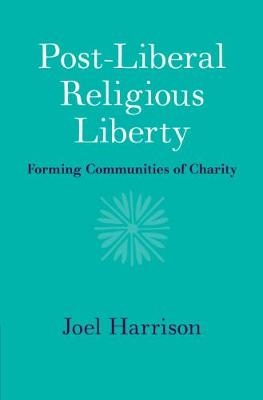
Post-Liberal Religious Liberty
Forming Communities of Charity
Seiten
2020
Cambridge University Press (Verlag)
978-1-108-83650-0 (ISBN)
Cambridge University Press (Verlag)
978-1-108-83650-0 (ISBN)
Why should we care about religious liberty? This book weaves together an answer from law, politics, and theology. It is for legal theorists debating this question and analysing religious liberty jurisprudence, political actors exploring our 'post-liberal' moment, and those wondering how Christian thought can shape law's relationship to religion.
Why should we care about religious liberty? Leading commentators, United Kingdom courts, and the European Court of Human Rights have de-emphasised the special importance of religious liberty. They frequently contend it falls within a more general concern for personal autonomy. In this liberal egalitarian account, religious liberty claims are often rejected when faced with competing individual interests – the neutral secular state must protect us against the liberty-constraining acts of religions. Joel Harrison challenges this account. He argues that it is rooted in a theologically derived narrative of secularisation: rather than being neutral, it rests on a specific construction of 'secular' and 'religious' spheres. This challenge makes space for an alternative theological, political, and legal vision. Drawing from Christian thought, from St Augustine to John Milbank, Harrison develops a post-liberal focus on association. Religious liberty, he argues, facilitates creating communities seeking solidarity, fraternity, and charity – goals that are central to our common good.
Why should we care about religious liberty? Leading commentators, United Kingdom courts, and the European Court of Human Rights have de-emphasised the special importance of religious liberty. They frequently contend it falls within a more general concern for personal autonomy. In this liberal egalitarian account, religious liberty claims are often rejected when faced with competing individual interests – the neutral secular state must protect us against the liberty-constraining acts of religions. Joel Harrison challenges this account. He argues that it is rooted in a theologically derived narrative of secularisation: rather than being neutral, it rests on a specific construction of 'secular' and 'religious' spheres. This challenge makes space for an alternative theological, political, and legal vision. Drawing from Christian thought, from St Augustine to John Milbank, Harrison develops a post-liberal focus on association. Religious liberty, he argues, facilitates creating communities seeking solidarity, fraternity, and charity – goals that are central to our common good.
Joel Harrison is Senior Lecturer at the University of Sydney, Sydney Law School.
1. Introduction; 2. The liberal egalitarian account; 3. Secularisation challenged; 4. Modern (Christian) responses; 5. The ecclesiological account; 6. Pluralism and disagreement; 7. Conclusion.
| Erscheinungsdatum | 02.07.2020 |
|---|---|
| Zusatzinfo | Worked examples or Exercises |
| Verlagsort | Cambridge |
| Sprache | englisch |
| Maße | 235 x 155 mm |
| Gewicht | 570 g |
| Themenwelt | Geisteswissenschaften ► Philosophie ► Ethik |
| Geisteswissenschaften ► Religion / Theologie | |
| ISBN-10 | 1-108-83650-X / 110883650X |
| ISBN-13 | 978-1-108-83650-0 / 9781108836500 |
| Zustand | Neuware |
| Haben Sie eine Frage zum Produkt? |
Mehr entdecken
aus dem Bereich
aus dem Bereich
unsere kollektive Verantwortung
Buch | Hardcover (2023)
wbg Theiss in Wissenschaftliche Buchgesellschaft (WBG) (Verlag)
CHF 46,90


